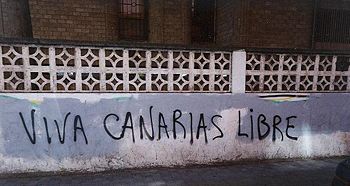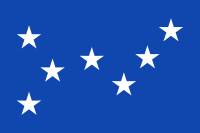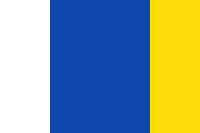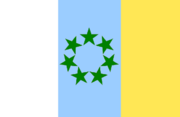
Canarian nationalism
Encyclopedia

Canarian people
The Canarians are an ethnic group living in the archipelago of the Canary Islands , near the coast of Western Africa...
. The term includes several ideological trends, ranging from the right to self-determination (and complete independence from Spain
Spain
Spain , officially the Kingdom of Spain languages]] under the European Charter for Regional or Minority Languages. In each of these, Spain's official name is as follows:;;;;;;), is a country and member state of the European Union located in southwestern Europe on the Iberian Peninsula...
) to a demand for further autonomy within Spain
Spain
Spain , officially the Kingdom of Spain languages]] under the European Charter for Regional or Minority Languages. In each of these, Spain's official name is as follows:;;;;;;), is a country and member state of the European Union located in southwestern Europe on the Iberian Peninsula...
.
Self-government through history
The origins of what is now considered "Canarian people" started with the Spanish conquest of the islands, when the local guancheGuanches
Guanches is the name given to the aboriginal Berber inhabitants of the Canary Islands. It is believed that they migrated to the archipelago sometime between 1000 BCE and 100 BCE or perhaps earlier...
population was defeated and eventually assimilated and Europe
Europe
Europe is, by convention, one of the world's seven continents. Comprising the westernmost peninsula of Eurasia, Europe is generally 'divided' from Asia to its east by the watershed divides of the Ural and Caucasus Mountains, the Ural River, the Caspian and Black Seas, and the waterways connecting...
an-style manorialism
Manorialism
Manorialism, an essential element of feudal society, was the organizing principle of rural economy that originated in the villa system of the Late Roman Empire, was widely practiced in medieval western and parts of central Europe, and was slowly replaced by the advent of a money-based market...
introduced in most of the islands.
During the last days of the conquest, on May 30, 1481, a Guanche leader from Gran Canaria
Gran Canaria
Gran Canaria is the second most populous island of the Canary Islands, with a population of 838,397 which constitutes approximately 40% of the population of the archipelago...
called Tenesor Semidán (afterwards baptized as Fernando Guanarteme
Fernando Guanarteme
Fernando Guanarteme was a Guanche ally of the Spaniards who assisted them in their conquest of the Canary Islands during the late fifteenth century. He was originally from Gran Canaria...
) signed a peace treaty with Ferdinand II of Aragon
Ferdinand II of Aragon
Ferdinand the Catholic was King of Aragon , Sicily , Naples , Valencia, Sardinia, and Navarre, Count of Barcelona, jure uxoris King of Castile and then regent of that country also from 1508 to his death, in the name of...
, in the so-called Carta de Calatayud. This treaty defined the archipelago as a kingdom
Monarchy
A monarchy is a form of government in which the office of head of state is usually held until death or abdication and is often hereditary and includes a royal house. In some cases, the monarch is elected...
within the Spanish monarchy, establishing the legal framework for its administration and its relationship with Spain.
The pact signed in Calatayud
Calatayud
Calatayud is a city and municipality in the province of Zaragoza in Aragón, Spain lying on the river Jalón, in the midst of the Sistema Ibérico mountain range. It is the second-largest city in the province after the capital, Zaragoza, and the largest town in Aragón other than the three provincial...
granted the rights and duties that would shape the Canarian fuero
Fuero
Fuero , Furs , Foro and Foru is a Spanish legal term and concept.The word comes from Latin forum, an open space used as market, tribunal and meeting place...
, which would soon be utilized in institutions such as the Cabildos
Cabildo (council)
For a discussion of the contemporary Spanish and Latin American cabildo, see Ayuntamiento.A cabildo or ayuntamiento was a former Spanish, colonial administrative council that governed a municipality. Cabildos were sometimes appointed, sometimes elected, but were considered to be representative of...
and the Canarian Court (). Notable rights stated in the fuero included an autonomous treasury and army, and the continuity of traditional Canarian customs and roles. The Canary Islands had its own currency
Currency
In economics, currency refers to a generally accepted medium of exchange. These are usually the coins and banknotes of a particular government, which comprise the physical aspects of a nation's money supply...
until 1776.
Initially only Gran Canaria
Gran Canaria
Gran Canaria is the second most populous island of the Canary Islands, with a population of 838,397 which constitutes approximately 40% of the population of the archipelago...
accepted the pact, but one by one the whole archipelago eventually consented to the agreement.
Spain failed to fulfill the pact several times, a failure that resulted in the uprisings of 1502 (Ichasagua), 1770 (La Aldea), and 1778 (Arico).
The pact was finally discarded during the Restoration
Spain under the Restoration
The Restoration was the name given to the period that began on December 29, 1874 after the First Spanish Republic ended with the restoration of Alfonso XII to the throne after a coup d'état by Martinez Campos, and ended on April 14, 1931 with the proclamation of the Second Spanish Republic.After...
.

Beginnings of organized nationalism
The first nationalistNationalism
Nationalism is a political ideology that involves a strong identification of a group of individuals with a political entity defined in national terms, i.e. a nation. In the 'modernist' image of the nation, it is nationalism that creates national identity. There are various definitions for what...
organizations were born in the 19th century as part of a local labour movement
Labour movement
The term labour movement or labor movement is a broad term for the development of a collective organization of working people, to campaign in their own interest for better treatment from their employers and governments, in particular through the implementation of specific laws governing labour...
. Some of its proponents were José Cabrera Díaz, Nicolás Estévanez
Nicolás Estévanez
Nicolás Estévanez was a Spanish military officer, politician and poet.Born in Las Palmas on 17 February 1838 the son of captain Francisco Estévanez and of Isabel Murphy...
and Secundino Delgado. Delgado is considered today as the father of the Canarian nationalism.
The earliests nationalists parties was the Partido Popular (Autonomista), founded in 1901 in Santa Cruz de Tenerife, and the Canarian Nationalist Party
Canarian Nationalist Party
The Nationalistic Canary Party is a nationalistic Canary party, which, in the first moment, he was inhaling to that Canaries it was a free and sovereign condition, though later it evolved to positions that defend the free associate condition, or even major competitions inside the autonomous...
, founded in 1924 in exile in Cuba
Cuba
The Republic of Cuba is an island nation in the Caribbean. The nation of Cuba consists of the main island of Cuba, the Isla de la Juventud, and several archipelagos. Havana is the largest city in Cuba and the country's capital. Santiago de Cuba is the second largest city...
.
During the Second Spanish Republic
Second Spanish Republic
The Second Spanish Republic was the government of Spain between April 14 1931, and its destruction by a military rebellion, led by General Francisco Franco....
Canarian nationalism went unnoticed; although an autonomy statute was proposed, the Spanish Civil War
Spanish Civil War
The Spanish Civil WarAlso known as The Crusade among Nationalists, the Fourth Carlist War among Carlists, and The Rebellion or Uprising among Republicans. was a major conflict fought in Spain from 17 July 1936 to 1 April 1939...
blocked hopes for autonomy.


During the dictatorship
Francoism fiercely oppressed any kind of regional nationalism in Spain and its colonies. However, the 1960s were years known for the activism of various groups. In 1959 the movement Canarias Libre acquired some notoriety, and in 1964, Antonio CubilloAntonio Cubillo
Antonio Cubillo founded the Canary Islands Independence Movement in 1963. This Algiers-based group began a terrorist campaign against Spanish rule in the late 1970s. In 1978 he was crippled in an assassination attempt linked to the security forces of the Spanish Ministry of the Interior...
founded the MPAIAC (Movement for the Self-determination and Independence of the Canarian Archipelago). The MPAIAC created the flag of the seven green stars that is accepted by the nationalist movement as a whole today.
During the last days of Francoism, the final decay of Canarian nationalism was preceded by some terrorist acts committed by the DAC (Destacamentos Armados Canarios) and the FAG (Fuerzas Armadas Guanches
Fuerzas Armadas Guanches
The Fuerzas Armadas Guanches was the armed wing of the Movimiento por la Autodeterminación e Independencia del Archipiélago Canario...
).
Spanish democracy
Since 1982 the Canary Islands have a statute of autonomyStatute of Autonomy
Nominally, a Statute of Autonomy is a law hierarchically located under the constitution of a country, and over any other form of legislation...
, never ratified by the people, that defines the archipelago as a nationality of Spain.
In the 1980s a nationalist-like party called UPC (Canarian People's Union) was the third most voted party in Canary Islands.
Since 1993, the nationalist party Canarian Coalition
Canarian Coalition
The Canarian Coalition , abbreviated to CC, is a Canarian nationalist and liberal political party in the Canary Islands of Spain. The party aim is for greater autonomy for the islands, but short of independence. The party has governed the Canary Islands since 1993...
has held the government of the islands.
Current situation
Nowadays there are a lot of parties, trade unions and associations of any kind that describe themselves as "nationalist".Some examples of nationalist parties include CC (Canarian Coalition
Canarian Coalition
The Canarian Coalition , abbreviated to CC, is a Canarian nationalist and liberal political party in the Canary Islands of Spain. The party aim is for greater autonomy for the islands, but short of independence. The party has governed the Canary Islands since 1993...
), NC (Nueva Canarias), CCN (Nationalist Canarian Centre), ANC (Nationalist Canarian Alternative), UP (People's Union).
Some examples of nationalist trade unions include FSOC (Frente Sindical Obrero Canario), IC (Intersindical Canaria).
The movement has recently undergone a modest renaissance. The most popular newspaper in the islands, El Día, has changed its editorial line to fit the nationalists' cause. In its pages it is normal to read the opinion of historical nationalist activists. In particular the "Project for a Federal Canarian Republic", written by Antonio Cubillo
Antonio Cubillo
Antonio Cubillo founded the Canary Islands Independence Movement in 1963. This Algiers-based group began a terrorist campaign against Spanish rule in the late 1970s. In 1978 he was crippled in an assassination attempt linked to the security forces of the Spanish Ministry of the Interior...
, has created a stir and a media debate.
Political parties
- Nueva Canarias
- Coalición Canaria
- Centro Canario Nacionalista
- Alternativa Nacionalista Canaria
- Partido Nacionalista Canario
- Unidad del Pueblo
- Alternativa Maga Nacionalista

